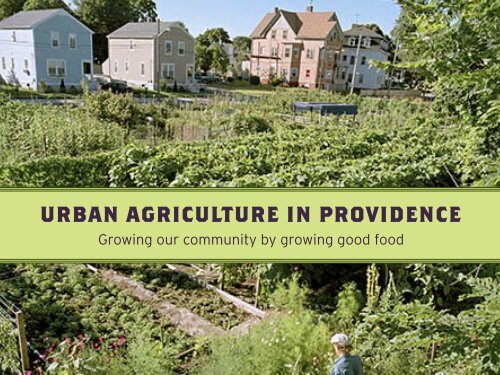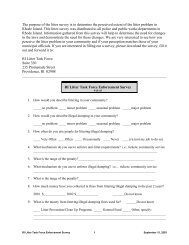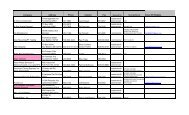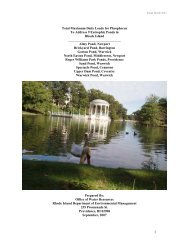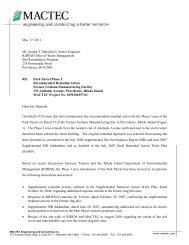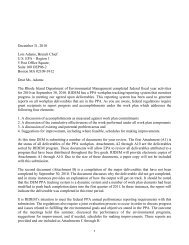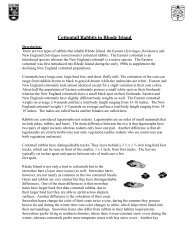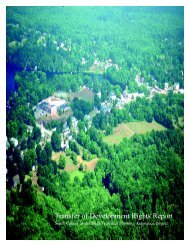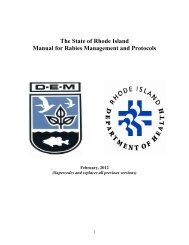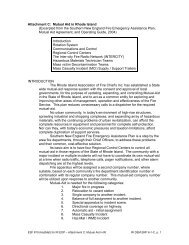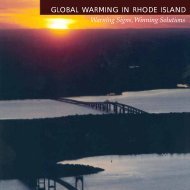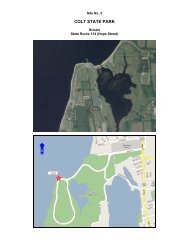urban agriculture in providence - Rhode Island Department of ...
urban agriculture in providence - Rhode Island Department of ...
urban agriculture in providence - Rhode Island Department of ...
You also want an ePaper? Increase the reach of your titles
YUMPU automatically turns print PDFs into web optimized ePapers that Google loves.
URBAN AGRICULTURE IN PROVIDENCE<br />
Grow<strong>in</strong>g our community by grow<strong>in</strong>g good food
The Providence Urban Agriculture Task Force envisions<br />
doubl<strong>in</strong>g the amount <strong>of</strong> food be<strong>in</strong>g grown <strong>in</strong> and around<br />
Providence <strong>in</strong> the next ten years. This will be achieved<br />
by <strong>in</strong>creas<strong>in</strong>g the number <strong>of</strong> home gardeners, community<br />
gardeners, community gardens, commercial community ag-<br />
riculture projects, and <strong>urban</strong> <strong>agriculture</strong> bus<strong>in</strong>esses.<br />
WHAT IS URBAN AGRICULTURE?<br />
Most people th<strong>in</strong>k <strong>of</strong> <strong>agriculture</strong> as someth<strong>in</strong>g that happens<br />
<strong>in</strong> the countryside, but <strong>agriculture</strong> takes place everywhere<br />
(see diagram on page 3). Even <strong>in</strong> the densest <strong>urban</strong> communities,<br />
people grow food on w<strong>in</strong>dowsills, ro<strong>of</strong>tops, and <strong>in</strong> back yards<br />
and vacant lots. Urban Agriculture means grow<strong>in</strong>g <strong>in</strong> ways<br />
uniquely adapted to small <strong>urban</strong> spaces, creat<strong>in</strong>g markets<br />
for local products, and decreas<strong>in</strong>g energy and environmental<br />
costs because food travels fewer miles to reach our markets<br />
and tables.<br />
Urban Agriculture is an important source <strong>of</strong> sustenance for<br />
city dwellers around the world. Accord<strong>in</strong>g to the United Na-<br />
tions, up to 15% <strong>of</strong> the food eaten by city dwellers worldwide<br />
is grown right <strong>in</strong> those cities. In modern cities like Vancouver<br />
and Toronto, nearly 40% <strong>of</strong> families grow some part <strong>of</strong> their<br />
own food. For many poor <strong>urban</strong> dwellers, the home garden is<br />
what keeps body and soul together.<br />
WHY IN PROVIDENCE?<br />
In the face <strong>of</strong> Global Warm<strong>in</strong>g and weather emergencies,<br />
political strife and ever-<strong>in</strong>creas<strong>in</strong>g fuel costs, we are <strong>in</strong>creas-<br />
<strong>in</strong>gly aware <strong>of</strong> the need to plan for the long-term needs <strong>of</strong> our<br />
community. Food security is an important part <strong>of</strong> this picture.<br />
Between 1964 and 1997, approximately half <strong>of</strong> <strong>Rhode</strong> <strong>Island</strong>’s<br />
farmland was lost to development and <strong>urban</strong> sprawl. Re<strong>in</strong>vigo-<br />
rat<strong>in</strong>g <strong>agriculture</strong> <strong>in</strong> the <strong>Rhode</strong> <strong>Island</strong> countryside and grow-<br />
<strong>in</strong>g more <strong>of</strong> our food locally are vital to prevent<strong>in</strong>g hunger and<br />
ma<strong>in</strong>ta<strong>in</strong><strong>in</strong>g healthy diets, creat<strong>in</strong>g jobs, and improv<strong>in</strong>g quality<br />
<strong>of</strong> water, air and soil.<br />
Currently, less than 2% <strong>of</strong> Providence families grow some<br />
<strong>of</strong> their food. Some grow just a couple <strong>of</strong> tomato plants <strong>in</strong><br />
conta<strong>in</strong>ers, while others tend <strong>in</strong>tensively-planted backyard<br />
gardens or community garden plots. Several <strong>of</strong> these home<br />
growers are entrepreneurs, rais<strong>in</strong>g food for sale through farm-<br />
ers’ markets, restaurants and local grocery stores. Addition-<br />
ally, Providence is beg<strong>in</strong>n<strong>in</strong>g to see agricultural community<br />
development projects and bus<strong>in</strong>esses built on local food<br />
production.<br />
We must cont<strong>in</strong>ue and expand this positive trend. Mak<strong>in</strong>g<br />
local food production a priority will contribute to the health <strong>of</strong><br />
our families, our local economy, and the susta<strong>in</strong>ability <strong>of</strong> our<br />
community.<br />
And locally-grown food tastes better and is better for you!
HOW DOES URBAN AGRICULTURE<br />
BENEFIT PROVIDENCE?<br />
• Creat<strong>in</strong>g A Healthy, Beautiful City for All<br />
Creat<strong>in</strong>g a clean, healthy environment<br />
Foster<strong>in</strong>g community caretakers <strong>of</strong> the city’s green spaces<br />
Increas<strong>in</strong>g property values<br />
• Creat<strong>in</strong>g Strong, F<strong>in</strong>ancially Stable Families<br />
Keep<strong>in</strong>g our families healthy through better nutrition<br />
Supplement<strong>in</strong>g family <strong>in</strong>comes by sell<strong>in</strong>g and shar<strong>in</strong>g produce<br />
• Encourag<strong>in</strong>g Economic Growth<br />
Support<strong>in</strong>g local bus<strong>in</strong>esses<br />
Creat<strong>in</strong>g jobs<br />
Keep<strong>in</strong>g local dollars local<br />
• Strengthen<strong>in</strong>g Communities<br />
Reflect<strong>in</strong>g the richness <strong>of</strong> our city’s cultures<br />
Connect<strong>in</strong>g neighbor-to-neighbor, generation-to-generation<br />
and culture-to-culture<br />
Transform<strong>in</strong>g neglected property <strong>in</strong>to beautiful, productive<br />
and safe spaces<br />
• Rais<strong>in</strong>g Healthier Kids:<br />
Teach<strong>in</strong>g children how to make healthy food choices<br />
Prevent<strong>in</strong>g childhood obesity
A HEALTHY, BEAUTIFUL CITY FOR ALL:<br />
LAND USE AND THE COMPREHENSIVE PLAN<br />
Zon<strong>in</strong>g and Comprehensive Plann<strong>in</strong>g both arose <strong>in</strong><br />
response to the ills <strong>of</strong> <strong>urban</strong>ization. Orig<strong>in</strong>ally, these tools<br />
were focused on keep<strong>in</strong>g <strong>in</strong>compatible uses apart,<br />
pr<strong>in</strong>cipally keep<strong>in</strong>g dangerous factories out <strong>of</strong> residential<br />
neighborhoods. Now these tools are used to better our<br />
neighborhoods by address<strong>in</strong>g citizen needs.<br />
The City <strong>of</strong> Providence Comprehensive Plan currently<br />
conta<strong>in</strong>s few specific actions to be undertaken to promote<br />
the grow<strong>in</strong>g <strong>of</strong> food <strong>in</strong> backyards, community gardens or<br />
on small farms.<br />
Both the Zon<strong>in</strong>g Ord<strong>in</strong>ance and Comprehensive Plan<br />
<strong>of</strong> Providence are be<strong>in</strong>g updated. This provides a<br />
tremendous opportunity to protect and promote <strong>urban</strong><br />
<strong>agriculture</strong> <strong>in</strong> a variety <strong>of</strong> forms by <strong>in</strong>clud<strong>in</strong>g <strong>in</strong>novative<br />
ideas found <strong>in</strong> other cities.<br />
Recommendations:<br />
• Create new community gardens on<br />
city property.<br />
• Implement an overnight on-street<br />
park<strong>in</strong>g program to get pavement out<br />
<strong>of</strong> backyards and gardens <strong>in</strong>.<br />
• Include language allow<strong>in</strong>g small<br />
scale, hand tended farms to operate<br />
with<strong>in</strong> the city limits, <strong>in</strong> harmony with<br />
their neighbors.<br />
• Remove Special Use Permit requirements<br />
for community gardens <strong>in</strong><br />
residential neighborhoods and create<br />
design standards that are beneficial<br />
to both the neighborhood and the<br />
gardens’ users.
STRONG, FINANCIALLY STABLE FAMILIES:<br />
Over a thousand Providence families grow some portion<br />
<strong>of</strong> their own food. This means that over 2000 people<br />
eat better and supplement their family <strong>in</strong>comes by produc<strong>in</strong>g<br />
food <strong>in</strong>side our city.<br />
A 10 ft by 10 ft family garden plot provides a Providence<br />
family with at least $80.00 worth <strong>of</strong> food over the course<br />
<strong>of</strong> a summer, which translates to at least $80,000 worth<br />
<strong>of</strong> food be<strong>in</strong>g grown <strong>in</strong> small plots across the city.<br />
Providence’s home gardeners and community gardeners<br />
say the same th<strong>in</strong>g: they love to garden, and the food<br />
they grow is important to their family.<br />
GARDENING IN LEAD-CONTAMINATED SOIL:<br />
Lead contam<strong>in</strong>ation is a result <strong>of</strong> Providence’s <strong>in</strong>dustrial<br />
past, and <strong>of</strong> the legacies <strong>of</strong> lead-based house pa<strong>in</strong>t and<br />
leaded gasol<strong>in</strong>e. To learn more about garden<strong>in</strong>g safely <strong>in</strong><br />
the city, call Southside Community Land Trust at<br />
(401) 273-9419 for a copy <strong>of</strong> a Lead Safety brochure.<br />
Recommendations:<br />
• Convert un-used land owned by the<br />
City, community agencies, bus<strong>in</strong>esses,<br />
churches, and neighborhood groups<br />
<strong>in</strong>to community food gardens.<br />
• Create a municipal curb-side compost<br />
system.<br />
• Provide small grants to help families<br />
create food gardens at home.
A PORTRAIT OF A FAMILY GARDENER:<br />
Lon Tang (pictured on the fac<strong>in</strong>g page) was a farmer <strong>in</strong><br />
Cambodia before he fled the Khmer Rouge <strong>in</strong> 1979. He<br />
came to Providence as a refugee <strong>in</strong> 1981. Soon after,<br />
friends led him to Southside Community Land Trust, which<br />
gave him the opportunity to grow traditional Cambodian<br />
foods for his family. Lon’s wife, mother-<strong>in</strong>-law, cous<strong>in</strong> and<br />
four children all love to grow and cook good food together.<br />
Lon began as a community gardener, and then moved<br />
onto a vacant city lot where, until the lot was built on, he<br />
raised organically grown Asian specialty crops for his fam-<br />
ily and for 15 restaurants and markets <strong>in</strong> Providence.<br />
Lon is proud <strong>of</strong> the example he sets for his children and<br />
his community, and <strong>of</strong> the contribution he makes to his<br />
home city, Providence. “It is important to pay back the<br />
people that helped me and my family do the right th<strong>in</strong>g—<br />
make food for people.<br />
If you want a strong country, you need strong food.”
A PORTRAIT OF AGRICULTURAL ENTREPRENEURS:<br />
Cather<strong>in</strong>e Mardosa and Matt Tracy (pictured on fac<strong>in</strong>g<br />
page) are heroes <strong>of</strong> <strong>urban</strong> <strong>agriculture</strong>. They began their<br />
bus<strong>in</strong>ess, Red Planet Urban Farm, with support from the<br />
SCLT City Farm. Red Planet grows organic produce on<br />
formerly neglected lots throughout Providence, as well<br />
as a small plot <strong>in</strong> Rehoboth. Recently, Cather<strong>in</strong>e and Matt<br />
purchased a 5,000 square foot lot <strong>in</strong> Olneyville, exchang-<br />
<strong>in</strong>g one <strong>of</strong> Matt’s pa<strong>in</strong>t<strong>in</strong>gs for the services <strong>of</strong> a property<br />
lawyer to help them complete the purchase.<br />
Red Planet uses as many local resources as possible,<br />
enrich<strong>in</strong>g the <strong>urban</strong> soil with compost from their West<br />
End and Federal Hill neighbors, c<strong>of</strong>fee grounds from local<br />
cafes, crab shells from Warren and seaweed from local<br />
beaches.<br />
Red Planet vegetables are sold through farmers’ markets<br />
around the city, through the Urban Greens Food Co-Op,<br />
and through local restaurants.<br />
“<br />
It’s important to us that the food is hyper-local, grown where<br />
it is sold.” — Matt Tracy, Farmer and Artist
ECONOMIC GROWTH:<br />
Ten small bus<strong>in</strong>esses operate <strong>in</strong>tensive farms on once-<br />
idle land with<strong>in</strong> the city <strong>of</strong> Providence. Their cash crops<br />
are primarily vegetables and artisanal specialty foods<br />
that are sold and bartered <strong>in</strong> niche markets such as<br />
farmers’ markets, restaurants, Urban Greens Food Co-op,<br />
ethnic groceries and flea markets. In a compact city<br />
like Providence, farms on the <strong>urban</strong> edge also contribute<br />
significantly to the nutritional and economic wellbe<strong>in</strong>g<br />
<strong>of</strong> the <strong>urban</strong> community.<br />
The five Providence farmers’ markets connect grow<strong>in</strong>g<br />
agricultural bus<strong>in</strong>esses with a grow<strong>in</strong>g customer base,<br />
provid<strong>in</strong>g fresh, nutritious food and stimulat<strong>in</strong>g economic<br />
growth. The city’s commercial growers share their<br />
success with donations <strong>of</strong> thousands <strong>of</strong> pounds <strong>of</strong> produce<br />
to local food pantries and the <strong>Rhode</strong> <strong>Island</strong> Food Bank.<br />
Recommendations:<br />
• Provide local growers with low-<strong>in</strong>terest<br />
loans and other micro-enterprise<br />
supports for start-up and land<br />
acquisition.<br />
• Support the creation <strong>of</strong> a year-round<br />
Providence Farmers’ Market to<br />
extend the economic benefits <strong>of</strong> local<br />
<strong>agriculture</strong>.<br />
• Cont<strong>in</strong>ue support <strong>of</strong> local bus<strong>in</strong>esses<br />
and needy families through ongo<strong>in</strong>g<br />
federal and state subsidies such<br />
as WIC and Seniors’ Farmers’ Market<br />
Vouchers.<br />
• Support Buy Local Campaigns to encourage<br />
the development and growth<br />
<strong>of</strong> local bus<strong>in</strong>esses.
STRENGTHENING COMMUNITIES:<br />
All over the city, <strong>urban</strong> food gardens are work<strong>in</strong>g to<br />
strengthen our communities. By creat<strong>in</strong>g a garden, local<br />
residents and organizations can transform under-used,<br />
blighted properties <strong>in</strong>to productive, safe and beautiful<br />
green spaces.<br />
The presence <strong>of</strong> a garden beautifies and stabilizes a<br />
neighborhood, raises property values and reduces<br />
local crime. These spaces provide food, exercise and economic<br />
opportunities to those who use them.<br />
Garden<strong>in</strong>g br<strong>in</strong>gs diverse residents together and catalyzes<br />
support to address serious issues that extend well beyond<br />
the gardens’ boundaries. It gives youth and elders an<br />
opportunity to share their knowledge and energy, and provides<br />
a productive environment <strong>in</strong> which our city’s youth<br />
can develop <strong>in</strong>to leaders and stewards <strong>of</strong> the community.<br />
Recommendations:<br />
• Recognize <strong>urban</strong> <strong>agriculture</strong> as a<br />
strategic asset for community development,<br />
neighborhood beautification<br />
and public safety.<br />
• Adequately fund non-pr<strong>of</strong>it <strong>urban</strong><br />
<strong>agriculture</strong> <strong>in</strong>itiatives that promote<br />
community, economic and youth development.<br />
• Provide <strong>in</strong>centives for <strong>in</strong>corporat<strong>in</strong>g<br />
food gardens <strong>in</strong>to the design <strong>of</strong><br />
new commercial and residential developments.<br />
• Celebrate the cultural benefits <strong>of</strong><br />
Urban Agriculture.
A PORTRAIT OF AN URBAN EXPERIMENT:<br />
The Urban Agricultural Unit, or UAU, is a mobile hydro-<br />
ponic greenhouse designed for educational, artistic, and<br />
commercial purposes. Created from a discarded shipp<strong>in</strong>g<br />
trailer, this greenhouse is capable <strong>of</strong> year-round food<br />
production and can be transported to various locations.<br />
Coupl<strong>in</strong>g <strong>in</strong>dustrial waste with advanced agricultural tech-<br />
nology, the UAU project is devoted to discover<strong>in</strong>g how to<br />
do more… with less.<br />
The UAU also works with local students and the communi-<br />
ty <strong>in</strong> educational programs designed to explore the <strong>urban</strong><br />
landscape. The study <strong>of</strong> the viability <strong>of</strong> <strong>urban</strong> <strong>agriculture</strong><br />
will be used as an educational tool for the promotion <strong>of</strong><br />
susta<strong>in</strong>able techniques and technologies that can be used<br />
<strong>in</strong> other <strong>urban</strong> environments, such as <strong>in</strong> community gar-<br />
den spaces and ro<strong>of</strong>top greenhouses.
A PORTRAIT OF A HEALTHY KIDS INITIATIVE:<br />
In Southside Community Land Trust’s after school Youth<br />
Garden Clubs, young people plant, care for and harvest<br />
fruits and vegetables <strong>in</strong> lush, <strong>urban</strong> gardens. Each spr<strong>in</strong>g,<br />
the D’Abate Youth Garden Club <strong>in</strong> the Olneyville neigh-<br />
borhood welcomes the new grow<strong>in</strong>g season by host<strong>in</strong>g<br />
the Farmer Festival. The Farmer Festival br<strong>in</strong>gs together<br />
a community <strong>of</strong> food growers & families to celebrate the<br />
youth garden, swap ideas, eat local food, and encourage<br />
each other to keep on grow<strong>in</strong>g. Tables <strong>of</strong>fer <strong>in</strong>formation<br />
on Farmers’ markets, how and why to eat more locally,<br />
veggie word searches, cook<strong>in</strong>g demonstrations, and op-<br />
portunities to get <strong>in</strong>volved <strong>in</strong> local organizations.<br />
“…a garden club…is important because it teaches our stu-<br />
dents to be stewards <strong>of</strong> the earth, to take care <strong>of</strong> the envi-<br />
ronment, by speak<strong>in</strong>g, listen<strong>in</strong>g, and apply<strong>in</strong>g math, science<br />
and literacy skills. It’s another way for them to see the real<br />
world and learn how to apply those skills and understand<br />
their community better.”<br />
— William D’Abate School Pr<strong>in</strong>cipal Lucille Furia
RAISING HEALTHY KIDS:<br />
Food grown <strong>in</strong> and around Providence <strong>of</strong>fers an untapped<br />
resource to our city’s schools. By effectively connect<strong>in</strong>g<br />
local farms and gardens with schools, we provide children<br />
with fresh, healthy fruits and vegetables. This creates<br />
educational opportunities and connects our children to<br />
the open space <strong>in</strong> their communities and throughout<br />
the state.<br />
Children fortunate enough to have schoolyard gardens<br />
have the opportunity to ga<strong>in</strong> garden<strong>in</strong>g and environ-<br />
mental stewardship skills that they will carry their whole<br />
lives. Research <strong>in</strong>dicates that gardeners, <strong>in</strong>clud<strong>in</strong>g<br />
children, have a higher <strong>in</strong>take <strong>of</strong> fruits and vegetables,<br />
and that food gardens provide appeal<strong>in</strong>g exercise and<br />
recreational opportunities to counter our children’s<br />
sedentary lifestyles.<br />
Recommendations:<br />
• Fund a state-wide Farm to School<br />
Coord<strong>in</strong>ator.<br />
• Pass legislation that creates f<strong>in</strong>ancial<br />
<strong>in</strong>centives for bus<strong>in</strong>esses to<br />
purchase RI-grown foods.<br />
• L<strong>in</strong>k school food service directors<br />
with farmers, so each <strong>of</strong> RI’s 36<br />
school districts make at least one local<br />
purchase each year.<br />
• Subsidize a year-round fresh fruit<br />
and vegetable program <strong>in</strong> ALL <strong>Rhode</strong><br />
<strong>Island</strong> schools.<br />
• Integrate <strong>agriculture</strong> and garden<strong>in</strong>g<br />
across school curriculum.
SUMMARY:<br />
The City <strong>of</strong> Providence faces the same challenges<br />
as cities throughout the country: the need for<br />
economic growth, the need for a healthier environment<br />
<strong>in</strong> which to raise families, and the need to<br />
plan for the susta<strong>in</strong>ability and security <strong>of</strong> our community<br />
<strong>in</strong> the face <strong>of</strong> emergencies and chang<strong>in</strong>g<br />
global circumstances.<br />
Providence is beg<strong>in</strong>n<strong>in</strong>g a city-wide process to update<br />
our Comprehensive Plan and zon<strong>in</strong>g ord<strong>in</strong>ances.<br />
This process <strong>of</strong>fers us a unique opportunity to<br />
meet the city’s challenges by creat<strong>in</strong>g land use<br />
policies that <strong>in</strong>clude Urban Agriculture <strong>in</strong> the longterm<br />
strategy for the city’s development. Do<strong>in</strong>g so<br />
will create economic opportunities for small bus<strong>in</strong>esses<br />
and for families throughout the city. We will<br />
contribute not only to the environmental health<br />
<strong>of</strong> our city and state, but to the physical health <strong>of</strong><br />
citizens <strong>of</strong> all ages and economic backgrounds. We<br />
will create ways for residents to take pride <strong>in</strong> their<br />
neighborhoods and showcase the cultural vitality<br />
that makes Providence great.<br />
Providence’s Urban Agriculture pioneers have already<br />
made a positive impact on our communities<br />
through farmers’ markets, community gardens,<br />
home gardens, non-pr<strong>of</strong>it community <strong>in</strong>itiatives,<br />
home kitchens and school lunch rooms and gardens.<br />
Please learn more, support these efforts, and<br />
help our community grow by grow<strong>in</strong>g good food!<br />
TO ORDER BOOKLETS:<br />
Contact Southside Community<br />
Land Trust<br />
109 Somerset Street<br />
Providence, RI 02907<br />
(401) 273-9419<br />
www.southsideclt.org
RESOURCES:<br />
White papers available at www.southsideclt.org:<br />
Plann<strong>in</strong>g for Appropriately Scaled Agriculture<br />
<strong>in</strong> Providence Ben Morton<br />
Urban Agriculture: A new approach to development <strong>in</strong><br />
Providence Greg Gerritt<br />
The Farm-to-School Subcommittee Summary Report<br />
Louella Hill and Dorothy Brayley<br />
LEAD BROCHURE: TITLE<br />
& AUTHOR?<br />
Local Organizations & Agencies:<br />
Aperion Institute for Environmental Liv<strong>in</strong>g: www.apeiron.org<br />
City <strong>of</strong> Providence: www.<strong>providence</strong>ri.com<br />
City <strong>of</strong> Providence Dept <strong>of</strong> Plann<strong>in</strong>g and Development:<br />
www.<strong>providence</strong>plann<strong>in</strong>g.org<br />
Farm Fresh RI: www.farmfreshri.org<br />
GrowSmart <strong>Rhode</strong> <strong>Island</strong>: www.growsmartri.com<br />
Kids First RI: www.kidsfirstri.org<br />
<strong>Rhode</strong> <strong>Island</strong> Farmways: www.rifarmways.org<br />
Southside Community Land Trust: www.southsideclt.org<br />
University <strong>of</strong> <strong>Rhode</strong> <strong>Island</strong> Cooperative Extension Service:<br />
www.uri.edu/ce<br />
Urban Greens Cooperative: www.<strong>urban</strong>greens.org<br />
General Internet Resources:<br />
Boston Natural Areas Network’s Master Urban Gardeners:<br />
www.bostonnatural.org/mug.php<br />
City Farmer’s Urban Agriculture Notes: www.cityfarmer.org<br />
The Community Food Security Coalition:<br />
www.foodsecurity.org<br />
The Food Project (Boston): www.thefoodproject.org<br />
Kitchen Gardeners International: www.kitchengardeners.org<br />
Books:<br />
Edens Lost & Found: How Ord<strong>in</strong>ary Citizens are Restor<strong>in</strong>g<br />
our Great American Cities, by Harry Willand and Dale Bell.<br />
Chelsea Green Publish<strong>in</strong>g Company, 2006. ISBN 1933392266<br />
Fields <strong>of</strong> Plenty: A Farmer’s Journey <strong>in</strong> Search <strong>of</strong> Real Food<br />
and the People Who Grow It, by Michael Ableman. Chroni-<br />
cle Books, 2005. ISBN 0811842231<br />
French Fries and the Food System: A Year Round Curriculum<br />
Connect<strong>in</strong>g Youth with Farm<strong>in</strong>g and Food, by Sara Coblyn.<br />
The Food Project, 2001. ISBN 0970353006<br />
On Good Land: The Autobiography <strong>of</strong> an Urban Farm, by<br />
Michael Ableman and Cynthia Wisehart. Chronicle Books,<br />
1998. ISBN 0811819213
The Urban Agriculture Policy Task Force was <strong>in</strong>itiated by Southside Community Land<br />
Trust, as a subcommittee <strong>of</strong> Citywide Green, <strong>in</strong> 2004. This coalition <strong>of</strong> more than 25<br />
members —farmers, policy-makers, community agencies, and also advocates —promotes<br />
policy changes that will ensure the future <strong>of</strong> food production <strong>in</strong> the Providence<br />
Metropolitan Area.<br />
The Cambodian Society <strong>of</strong> RI<br />
Citywide Green<br />
Cleanscape, Inc<br />
Elmwood Collaborative and<br />
Elmwood Foundation<br />
Farm Fresh RI<br />
Friends <strong>of</strong> India Po<strong>in</strong>t Park<br />
Green Party <strong>of</strong> <strong>Rhode</strong> <strong>Island</strong><br />
Groundwork Providence<br />
Kids First<br />
Olneyville Collaborative<br />
Olneyville Hous<strong>in</strong>g<br />
Planted on Hope<br />
Project Outreach<br />
Providence Parks <strong>Department</strong><br />
PUENTE<br />
Red Planet<br />
RI Center for Agriculture<br />
Promotion and Education<br />
RI DEM / Division <strong>of</strong> Agriculture<br />
RI <strong>Department</strong> <strong>of</strong> Health<br />
RI Food Bank<br />
RI Land Trust Council<br />
Roger Willams Park Zoo<br />
Southern RI Conservation District<br />
Southside Community Land Trust<br />
URI Cooperative Extension<br />
URI Fe<strong>in</strong>ste<strong>in</strong> Center for Hunger<br />
West Bay Community Action<br />
Woonasquatucket River<br />
Watershed Council<br />
The Urban Agriculture Task Force gratefully acknowledges the generous support <strong>of</strong> The Jessie B. Cox Charitable<br />
Trust and USDA Community Food Project Grant.<br />
Contributors to this booklet: Green Party <strong>of</strong> RI: Greg Gerritt; Elmwood Collaborative: Rachel Newman Greene;<br />
Farm Fresh RI: Louella Hill; Kids First RI: Dorothy Brayley; <strong>Rhode</strong> <strong>Island</strong> Center for Agricultural Promotion and<br />
Education: Stu Nunnery; Southside Community Land Trust: Kather<strong>in</strong>e Brown, Kate Hitmar, Ben Morton, Kiera<br />
Mulvey; PUENTE: Sara Struever. Editor: Rachel Newman Greene. Graphic Design: Sara Struever.


